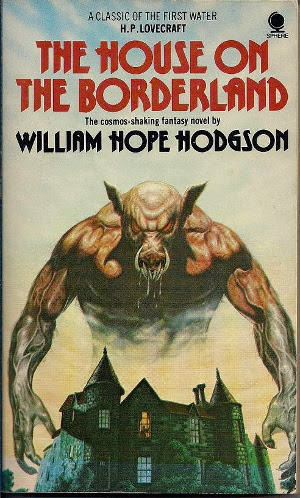It was time to pick out a book to read, and I saw William Hope Hodgson’s The House on the Borderland on my shelf.

I think I’ve had it for over 30 years but never read it. Time to give it a try. If I thought I’d want to reread it, I’d keep it. If I didn’t, I’d deaccession it. I’m trimming my collection.
There’s an introduction by Gerald Suster in my edition. It begins:
The book you have bought is unique in English literature. Its blend of horror, fantasy, science fiction, mind expansion and spiritual dread, was called “a classic of the first water” by H.P. Lovecraft, this century’s greatest American weird fiction writer. Yet, as Lovecraft admitted, its imaginative power is sadly impaired by bad writing.
Lovecraft thought it was badly written?! Cripes, that’s reason enough not to even try. But the Wikipedia entry on the book quotes Terry Pratchett saying it was “the Big Bang in my private universe as a science fiction and fantasy reader and, later, writer.” That’s certainly reason to try.
I read the first couple of chapters, then looked towards the end.
Another, a troubled, memory came to me—of the Formless Thing that had haunted the shores of the Sea of Sleep. The guardian of that silent, echoless place. These, and other, details, I remembered, and knew, without doubt that I was looking out upon that same sea. With the assurance, I was filled with an overwhelming feeling of surprise, and joy, and shaken expectancy, conceiving it possible that I was about to see my Love, again. Intently, I gazed around; but could catch no sight of her. At that, for a little, I felt hopeless. Fervently, I prayed, and ever peered, anxiously…. How still was the sea!
Down, far beneath me, I could see the many trails of changeful fire, that had drawn my attention, formerly. Vaguely, I wondered what caused them; also, I remembered that I had intended to ask my dear One about them, as well as many other matters—and I had been forced to leave her, before the half that I had wished to say, was said.
I should have read it when I was young. I can imagine how this kind of story caught Pratchett when he was young, but it just doesn’t grab me any more. I’m not even going to read it once. (If you want to, the full text is in the Gutenberg Project.)
Pratchett, though, I continue to reread.
 Miskatonic University Press
Miskatonic University Press